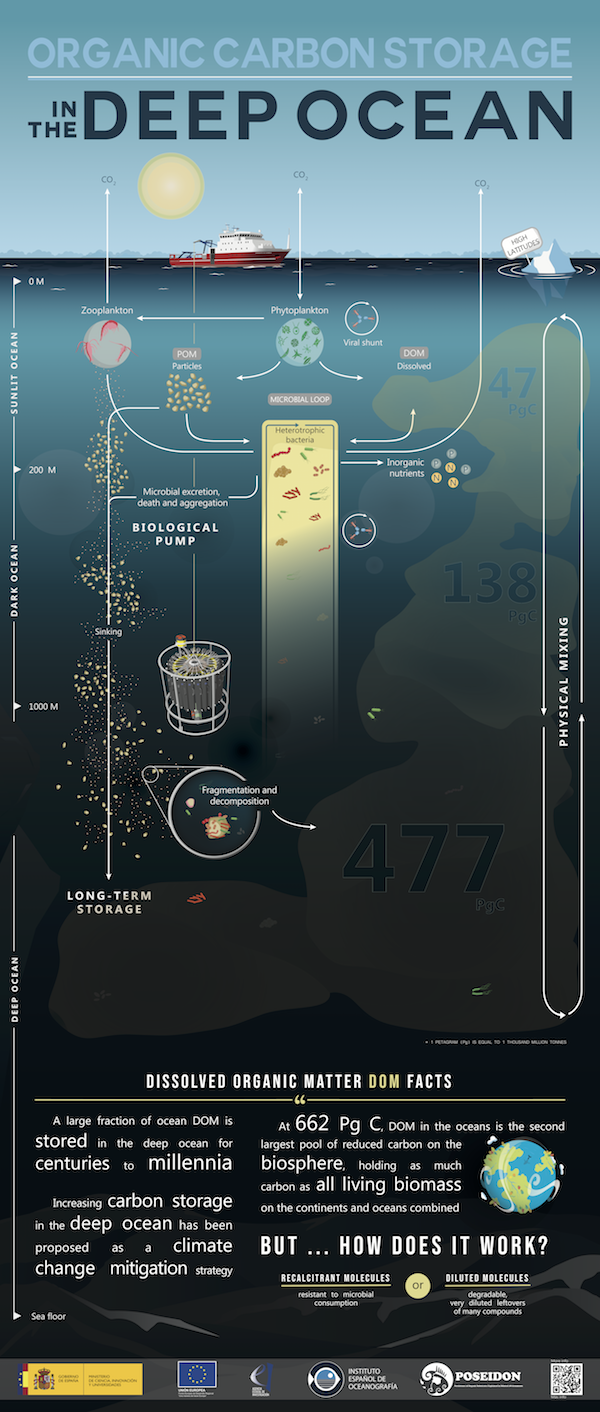Ph.D. Program in Oceanography and Global Change at the Canary Islands, Spain
Resumen
La materia orgánica disuelta (DOM, por sus siglas en inglés) presente en los océanos representa el segundo reservorio más importante de carbono orgánico de la biosfera. La mayor parte de este carbono está almacenado en aguas profundas por debajo de los 1000 metros y parece no estar disponible para su descomposición por comunidades microbianas. La explicación clásica es que el DOM está compuesto por estructuras recalcitrantes que no pueden ser degradadas. Sin embargo, Arrieta et al. (2015) reevaluaron la “hipótesis de dilución”, poniendo a prueba la hipótesis alternativa de que los compuestos que forman el DOM del océano profundo no son intrínsecamente recalcitrantes, sino que su utilización está simplemente limitada por las concentraciones extremadamente bajas de cada una de las moléculas individuales que la componen. La presente tesis doctoral trabajará sobre la hipótesis de que la heterogeneidad del DOM limita la eficiencia y la tasa de conversión de carbono y contribuye a mantener una elevada diversidad microbiana en el océano profundo.
Esta investigación se encuentra financiada por el Ministerio de Ciencia e Innovación como parte del proyecto POSEIDON liderado por el Dr. Jesús M. Arrieta. Más información sobre el proyecto en https://oceanography.es/.
Referencia:
Arrieta, J. M., Mayol, E., Hansman, R. L., Herndl, G. J., Dittmar, T., and Duarte, C. M. (2015). Dilution limits dissolved organic carbon utilization in the deep ocean. Science 348, 331–333. doi:10.1126/science.1258955.
Abstract
Marine Dissolved Organic Matter (DOM) is the second largest reservoir of organic carbon in the biosphere. Most of the oceanic DOM is stored in deep waters under 1,000 m locked away from the atmosphere and seems to be unavailable to microbial decomposers. The classic explanation has been that DOM is composed of highly recalcitrant substances which cannot be degraded by microbes. However, Arrieta et al. (2015) reevaluated “the dilution hypothesis”, testing the alternative hypothesis that the compounds that make the bulk of the DOM pool in the deep ocean are not intrinsically recalcitrant but their utilization is simply limited by the extremely low concentrations of each individual molecule. The present PhD will work on the hypothesis that the heterogeneity of DOM is constraining carbon conversion efficiency and speed and maintaining a high microbial diversity in the deep oceanic real.
This work is funded by the Spanish Ministry of Science and Innovation (MICINN) as part of the POSEIDON project lead by Dr. Jesús M. Arrieta. Find more information about the project here: https://oceanography.es/.
Reference:
Arrieta, J. M., Mayol, E., Hansman, R. L., Herndl, G. J., Dittmar, T., and Duarte, C. M. (2015). Dilution limits dissolved organic carbon utilization in the deep ocean. Science 348, 331–333. doi:10.1126/science.1258955.




